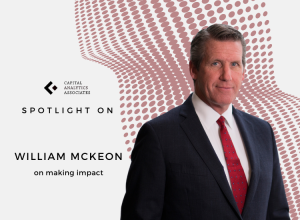 3 min read March 2024 — The Texas Medical Center has the economic impact of a small European country. “We represent $22 billion in GDP, and I’m just speaking about our campus,” president and CEO William McKeon told Invest: in an interview.
3 min read March 2024 — The Texas Medical Center has the economic impact of a small European country. “We represent $22 billion in GDP, and I’m just speaking about our campus,” president and CEO William McKeon told Invest: in an interview.
What is the contribution of the Texas Medical Center (TMC) to the Houston region?
As the home to 60+ healthcare, higher education and non-profit institutions, the Texas Medical Center is unique. Our 1500 acre campus alone represents $22 billion in GDP, employs 120,000 people (with 10,000 job openings at almost all times), and treats over 10 million patients a year in the largest and most diverse medical population in the world. TMC is proud to be the steward of this campus and our team does everything possible to multiply the impact our great institutions have not only on Houston, but around the world.
If you look at healthcare in almost any other U.S. city, it’s fragmented. Hospitals and research buildings are often dispersed throughout a city. TMC, however, is one massive, contiguous campus consisting of the largest collection of hospitals, research buildings, medical schools, and nursing schools. This affords us the opportunity to drive synergistic initiatives in innovation, research and artificial intelligence at such a scale that does not exist anywhere else in the world.
What is TMC’s contribution in terms of research and development?
Because of the strength and diversity of our hospitals, colleges and universities TMC is both a global destination for healthcare and the largest research platform in the world. More clinical trials take place on this campus than in any other place. You won’t find anything of the size and stature of the Texas Medical Center anywhere else in the United States. We are home to the No. 1 cancer center in the world and the largest children’s hospital. If you look out my window, you can see a multitude of construction cranes; they represent rapid growth across this medical city.
In addition to our longstanding healthcare and education institutions, Texas Medical Center has created the largest incubator in the country for startup companies. We’ve launched over 300 startup companies in our incubator. Texas Medical Center operates a $50 million venture fund for startup companies. Together, these two programs have proven that the continuum of science and industry can thrive in Houston.
Texas Medical Center has built on our historic strength in healthcare and real estate to create an entire ecosystem of life sciences. We make investments to lift all ships, to make us the fastest, most powerful engine for discovery, all the way to commercialization.
What initiatives are underway in biomanufacturing?
The very way we deliver medicine is changing with cell and gene therapy. Historically, if you have a disease like cancer you will receive a drug, radiation or chemotherapy. What’s happening today, not 10 years in the future, is cell and gene therapy. If we find that someone has cancer, we can take that person’s blood and cells and look for the variant in their genome, re-engineer it and deliver it back to the patient to essentially “turn off” the cancer. It’s one of the most fascinating things that’s happening in medicine today. But to be successful and to save lives, you need to do that biomanufacturing locally. We’re taking your blood, and in days and weeks, we’re reintroducing it to your body as a cure. It’s phenomenal, and it holds so much promise for the future. But to achieve that promise, we need spaces that are designed for cell and gene therapy manufacturing, and we are developing that right here on the TMC campus.
What is the key to fostering a successful environment for healthcare innovation?
When I arrived here 10 years ago, we didn’t have an innovation center. Driven by my experiences as a CEO in Shanghai and in London and places where I built companies from the ground up, I knew that you need to have an ecosystem to speed success. I didn’t have one. So I had to build this on my own. I wanted to make sure we, as a team, built the ecosystem needed here to be successful, because there is a high failure rate for new ventures. The success rate is typically 1 in 20; if we do nothing, it is much lower and if we create an ecosystem, the results get significantly better.
We look for unique things that advance healthcare and we make investments in that ecosystem.
What is your outlook for the next two to three years?
The life science industry is the fastest growing vertical in the country – it has grown by 80% over the past decade. Healthcare demand is on the rise and we require new innovations to improve outcomes while reducing costs. It is TMC’s mission to advance health, education and research. We are continually investing in the life science ecosystem to accelerate discoveries to advance care of patients.
For more information, please visit:
